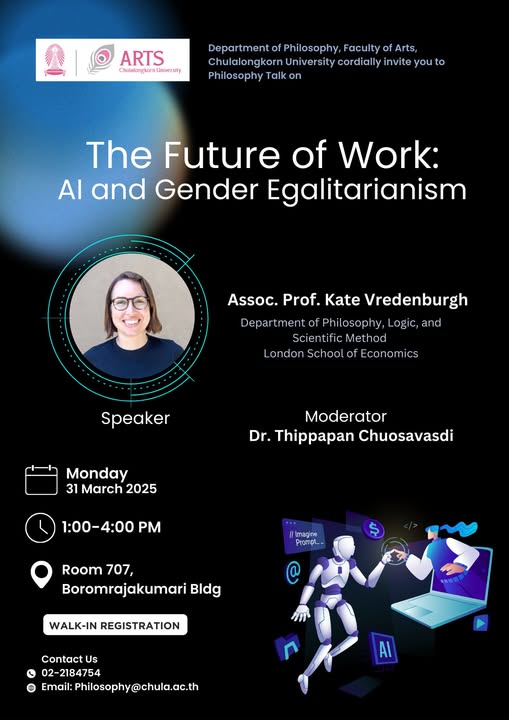
ภาควิชาปรัชญา คณะอักษรศาสตร์ จุฬาลงกรณ์มหาวิทยาลัย ขอเชิญร่วมฟังเสวนาปรัชญาเรื่อง “The Future of Work: AI and Gender Egalitarianism” โดย Assoc. Prof. Kate Vredenburgh จาก Department of Philosophy, Logic and Scientific Method ณ ห้อง 707 อาคารบรมราชกุมารี วันที่ 31 มีนาคม 2568 เวลา 13.00-16.00 น.
เมื่อพูดถึงความยุติธรรมทางสังคม แม้ในปัจจุบันเรามีแนวโน้มจะนึกถึงเรื่องการยอมรับตัวตน (recognition) หรือการที่กลุ่มชายขอบได้รับการมองเห็นและความเคารพจากสังคม แต่เรื่องการกระจายทรัพยากร (redistribution) เช่น เงื่อนไขทางเศรษฐกิจ โอกาสด้านอาชีพ และความมั่นคงทางการเงิน ก็ไม่ได้หมดความสำคัญ ดังที่แนนซี เฟรเซอร์ (Nancy Fraser) เตือนเราไว้ในข้อถกเถียงระหว่างเธอกับอักเซล ฮอนเน็ธ (Axel Honneth) ว่าแม้การต่อสู้เพื่อการยอมรับตัวตนจะเป็นหัวใจของความยุติธรรม แต่หากไม่มีการกระจายทรัพยากรที่เป็นธรรม ความยุติธรรมก็ไม่อาจสมบูรณ์ได้
ในการเสวนาครั้งนี้ วิทยากรจะพาเรากลับมามองมิติของการกระจายทรัพยากร ในยุคที่ AI กำลังเข้ามาเปลี่ยนแปลงโลกของงาน และชวนเราร่วมกันสืบค้นความเป็นไปได้ของการใช้ปัญญาประดิษฐ์เป็นเครื่องมือส่งเสริมความเสมอภาคทางเพศ ด้วยการปรับเปลี่ยนเงื่อนไขของงานและการจ่ายค่าตอบแทนแก่แรงงาน ให้ใส่ใจมากขึ้นกับความจำเป็นเฉพาะของแรงงานเพศหญิงที่เป็นกลุุ่มเสียเปรียบ และรับบทที่เฟมินิสต์มาร์กซิสม์บางรายเรียกว่า กองทัพแรงงานสำรอง คอยทำงานประเภทฟรีแลนซ์ งานบ้านและงานดูแลเด็ก ผู้ป่วยและคนชรา ด้วยอัตราค่าจ้างที่ถูกกว่า
ท่านที่สนใจมาร่วมฟัง ถกเถียง ตั้งคำถามและจินตนาการใหม่กับเราว่า AI จะนำไปสู่ความเสมอภาคระหว่างเพศในบริบทของงานในปัจจุบันได้อย่างไร สามารถลงทะเบียนหน้างาน หรือสอบถามรายละเอียดเพิ่มเติมได้ที่ 02-218-4754 หรือ Email: Philosophy@chula.ac.th
Abstract
In this talk, I argue that there are gender egalitarian reasons of justice to use artificial intelligence to standardize work, in order to reduce the wage penalty for flexible working. Core to the argument is a case study by Claudia Goldin and Larry Katz (2016) of pharmacy work in the United States in the 20th century. Due to technological innovations, as well as changes to health insurance and the ownership of pharmacies, pharmacy shifted to a profession with a high percentage of women, no wage penalty for flexible working, and a median wage that increased relative to other comparable professions. I will give empirical reasons to think that some deployments of AI in workplaces could reduce the wage penalty, and then give a moral argument that there are reasons of gender egalitarian justice to do so. In particular, I argue that reducing the wage penalty mitigates reasonable complaints from women; but, whether or not standardizing work reduces the gendered division of labor depends on controversial empirical assumptions. Finally, I deal with four objections: the objection from precarious work and standardization; the objection from meaningful work and the exercise of capabilities at work; the argument from class-based inequality; and, the objection from conservatism about value and the greater ability of larger firms to invest in AI, compared to small and medium sized firms.




